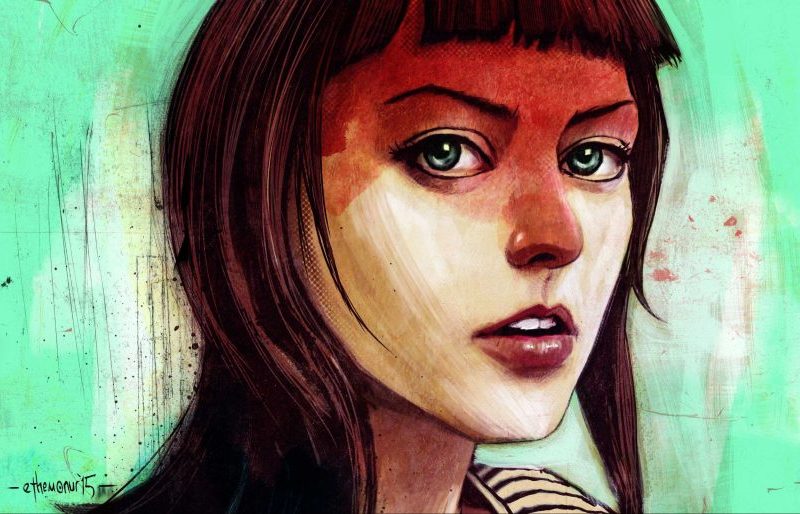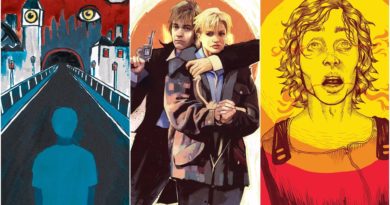I've never really been about sunshine and daisies: Angel Olsen
A chat with Angel Olsen right before her Istanbul show at Salon IKSV on September 12.
Interview by Chris McLaren, Illustration by Ethem Onur Bilgiç
Raised in St. Louis, Missouri—right in the centre of the US—Angel Olsen rebelled against her Christian private school upbringing by playing in the obligatory high school punk band. As she grew out of her teenage angst, she gravitated towards acts like Pedro the Lion, Yo La Tengo, and Neutral Milk Hotel, quieter music that inspired her to develop her songwriting and bring her lyrics and voice—honeyed serenading to piercing “fuck you”—to the forefront. Her 2010 cassette release, Strange Cacti, caught the ear of Will Oldham, who invited her to collaborate and join his touring band as a backup singer. Though grateful for the experience, Olsen amicably parted ways with Oldham to focus on her own music, building on the strength of 2012’s Half Way Home with last year’s Burn Your Fire For No Witness, an album exuding a crackling slow-burning intensity.
Most press Olsen has received places her music within the canon of Americana, which seems fair, given the finger picking that dominates Strange Cacti, the vocal cadence that brings to mind Dolly Parton (she’s covered Parton’s “I Couldn’t Wait Forever”), and the country waltz foundations of a number of Burn Your Fire tracks. However, try telling this to Olsen, and she just might kick your butt. After watching her 12 September performance at Salon IKSV—at times deafening drums, squealing guitars, and shredded vocals—it’s clear that she is more fire than folk.
Wanting to get some fresh air after soundcheck, Olsen elected to sit outside in the rain for a pre-show interview with Bant.
What was your entry into music? Do you have any formal vocal or guitar training?
I started playing music as a small child, I’d play keyboards and piano. My parents bought me a Yamaha keyboard when I was like four, just like any child has a toy or something and starts playing with pianos and stuff early on. I also got a Panasonic tape recorder and started recording cassette tapes and dubbing harmonies over them as a kid. And getting used to that, I sort of learned what my voice could do and how to teach it to do other things and figure out how notes felt when they sounded a certain way. There’s a certain kind of science to just listening back to the thing that you’re doing. So recording is a huge part of developing your voice; listening back a few days later can change your perspective a great deal from just listening back 10 minutes after you do it. I think a lot of that helped me.
My piano teacher was very Catholic and she hated that I had some fake nails one day, so she told me I couldn’t play piano anymore unless I didn’t have them. I stopped learning piano, and I was never really good at just following theory, like watching it. So I started playing guitar, and my guitar teacher was like, “Here, just play it. I don’t want to teach you theory. Just play it, and you’ll find the notes. I trust that you’ll find them.”
What are your big takeaways from your time spent working with Will Oldham?
I was pretty introverted at the time, I was younger then everyone and female, and I didn’t feel like musically or creatively it was even my place to say, “Things should change here…” So there were a lot of, not eggshells to walk on, but things that I had to navigate. But I think just by watching them and noticing the way everything sort of worked within the music industry—with sound engineers, with venue owners, with promoters, with how many interviews sometimes you have to do on a tour at the very beginning of a record [cycle]—a lot of that stuff prepared me for the music industry that would be applied to the last record that I did.
So in some ways the tables have turned. I’m a bandleader, I have to be the person that makes sure everyone is comfortable and taken care of. I’m very introverted/extrovert person. I might be loud on the stage and sing and stuff, but I don’t really like to be the person who makes sure that everyone has their special time. To me, it’s like, “It’s up to you to have fun! It’s in your head. Make fun happen.” But those roles we’re kind of happening just by default. And also meeting these amazing musicians and figuring out how to develop a language where I could talk about my songs was a huge change, and not something I could do before I worked with him. I think a lot of that, just a lot of music industry and teaching a band one of my songs in a way that’s very exact and patient, you have all of these things, the tone of your voice is super important. You can’t be like, “No, that sucks! That’s not it!” I mean, every single thing is super particular to any part of an artist, so everything you say has to be the perfect way it can be said. It’s an interesting group of things that I’ve learned, but I also have decided that I think we are very different people of course. And there are things I would do that he wouldn’t do and vice versa. I’ve taken what I can from that experience and hope that he would know that.
I’ve noticed that in different parts of the world, certain aspects of Americana don’t translate…
I guess I don’t really consider my music Americana, but part of it I guess is, in some ways. Folk-based music is considered Americana in a lot of ways. I guess I never really considered myself that because I feel like I’m doing too many other things that also include that as well. So it’s not really just that genre that I feel. If for whatever reason one genre isn’t reaching someone, hopefully another one will is what I mean.
I wasn’t trying to say that your music is Americana, exactly…
I will kick your butt! [Laughing] I’m not Americana, ok?!?
Ok, ok! But have you noticed different reactions when playing your older music, however you want to characterize it?
Yeah, definitely, but I’ve also noticed some people prefer the quieter stuff. I go to Ireland, I think people like it. They prefer more lyric-based material, and I think it’s because—and maybe I’m just naive in thinking this—but in Ireland, people really care about the words. They care about poets, and they care about hearing the words. There are people who really appreciate that and people who would rather just get their aggression out through a song and hear punk rock music that they just feel.
As a solo artist, a lot of people take your lyrics to be literal first-hand accounts, while you have said that your songs often portray characters; do you draw inspiration for these characters from things you see, things you watch, things you listen to?
Definitely. Since I was a little girl, I would watch a film and just be thinking about it for a few days, wanting to replicate the characters or have my cousins over and we would replicate the scene or something. I always thought I would go into theater or film because all I wanted was to create stuff that was, see stuff and recreate it better or recreate it in my own way. I think if you’re a musician and you’re also and a singer and then also a songwriter, you can kind of do all of those things, be the actor, be the writer, and be sort of the director of the whole thing as well. But I think sometimes too you have these experiences, and you have ultimatums, and you have these almost epiphanies that later on in your life you realize those epiphanies were just moments that were real and they passed. I think some songs were characters about different epiphanies. I still feel like when I look at it and when I listen back to the material, it’s now that I can understand some of it. It’s taking on these characters or these emotions or feelings, definitely from things I’ve experienced and things I’ve seen, but sometimes I have no idea where it’s coming from as well. So when people ask if it’s about me, maybe in some ways it is, but I hope that it’s not totally just about me. I guess a lot of different things inspire my writing; I’m still navigating it myself, as you can probably tell.
In prepping for this interview, I came across this Allmusic.com page with some amazing tags for your music [samples: eerie, gloomy, autumnal, brooding, somber]; what kind of descriptors would you use?
[Reading through the tags] I really love “bleak”! “Brittle”! “Ominous”!
Most of my music is dark and sad, so the lyrics and the music go together a lot of the time. But if you listen to a lot of rock and roll songs, some of the lyrics are super bleak—it’s just that it happens that the beat isn’t. I think some of that is true—I think it is dark, and I’m not ashamed of it. But I also think that when I watch a dark film sometimes, or when I read something that is dark—I’m not saying I’m a goth or anything—but it definitely in some ways can be uplifting knowing you’re not super alone in that feeling. You can have this totally isolating feeling or thought and be like, “I’m the only one this is happening to, and what’s even next for me?” and have all these doubts. But when you watch a film that really moves you, you’re reminded of life being beautiful, and all of those things that were really annoying or frustrating or terrible are actually part of the thing that makes you happy, and it’s all worth it. I’m not trying to be pretentious, I’m just saying, “Hey, you’re not the only one,” or, “There are other people in the world that think these things.” I like happy music, but I’ve never really been about sunshine and daisies.



